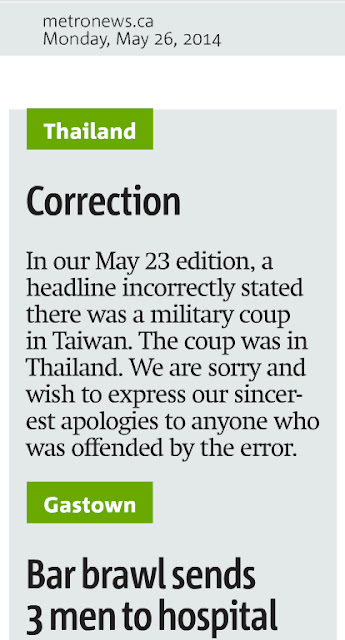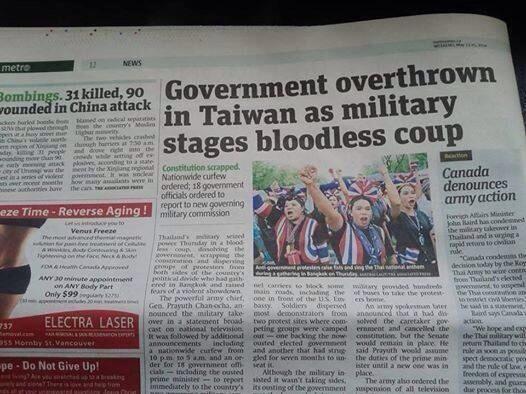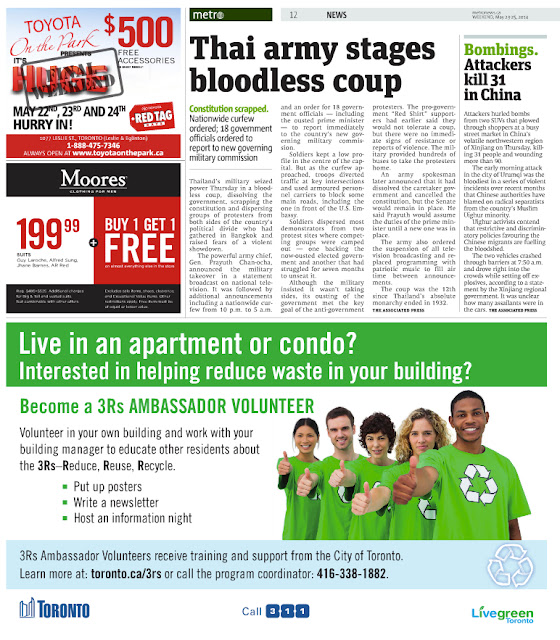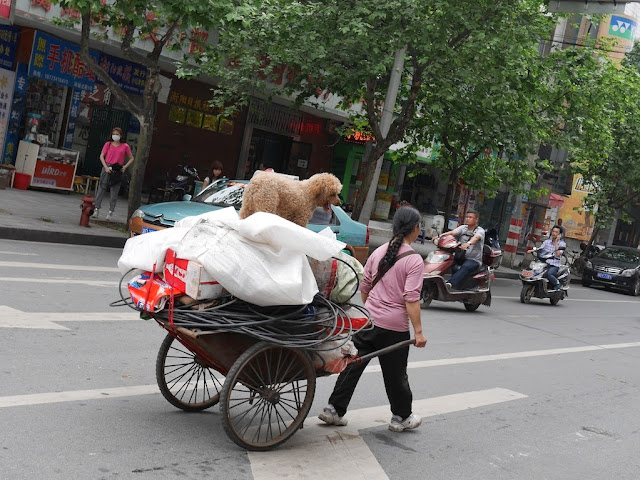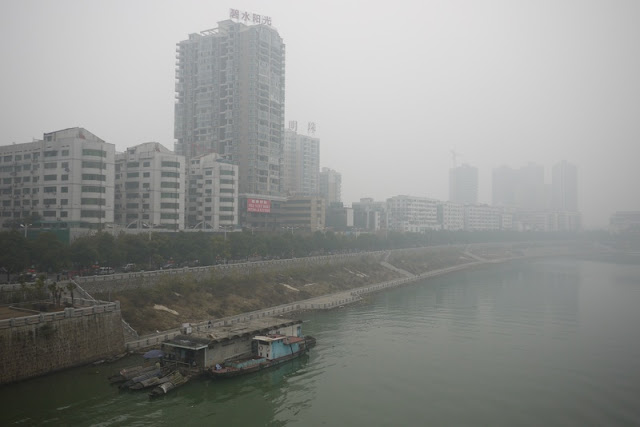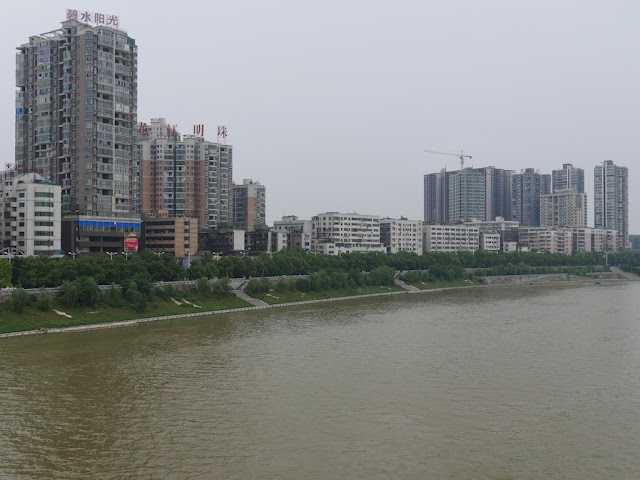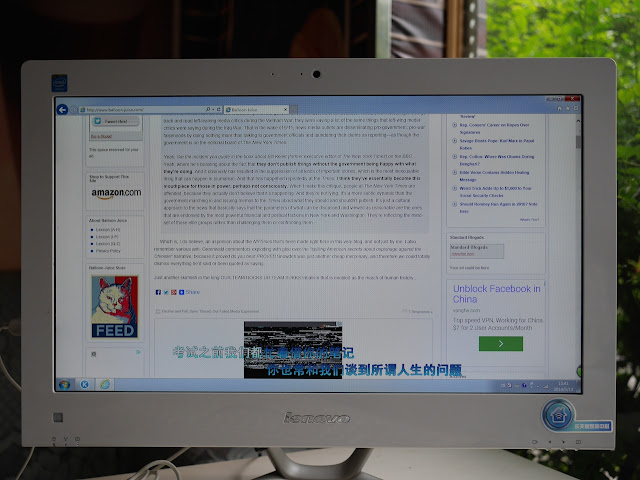In previous years, I have documented
some of the impact of China's Great Firewall, which selectively blocks or interferes with websites and services on the Internet in China. When I typically connect to the Internet, though, I use a paid-for personal virtual private network (VPN). The VPN allows me to have an online experience as if I were outside of China and not directly affected by the Great Firewall. China has at times taken efforts to block personal VPNs, but the companies providing them can offer new ways to connect. It can feel somewhat like a game of
Whac-A-Mole.
Recently, I stopped by a cafe in Hengyang, Hunan province, and sat at a table which had a computer with Internet access. I took advantage of the opportunity to see whether what I saw on a "local" computer presumably not using a VPN differed from what I had seen while not using a VPN on my own computer. Most seemed the same. For example, my own blog was partially blocked, likely due to it having a non-blocked domain name but being hosted on Google's Blogger, which is blocked in China. To serve as a sort of baseline, part of my quick exploration included visiting several foreign websites that I would not expect to be blocked in China. One aspect of what I saw offers an opportunity to highlight some issues regarding VPN usage in China.
I checked ESPN's sports website first. After an initial pause, it loaded and based on just looking at it nothing was obviously amiss*.
But one portion of the screen jumped out at me: an advertisement for a "VPN for China" from
GoTrusted with the selling point of unblocking websites such as Facebook and YouTube.
I clicked the ad and GoTrusted's website quickly loaded.
Next, I checked two blogs offering viewpoints from different sides of the American political spectrum. One,
Balloon Juice, has a more liberal perspective and was not blocked.
It had an ad for another site offering VPNs,
vpngfw.com. Facebook and China were again both specifically mentioned. I clicked the ad and the site loaded without any apparent problem.
The other blog I visited,
Hot Air, offers a more conservative perspective and loaded without any obvious problems as well.
Not only did Hot Air include ads for both of the previously mentioned VPNs, but it also had other ads such as "Explore Topeka" and "Immigration Attorney".
China probably isn't too concerned about ESPN, Balloon Juice, Hot Air, or information on Topeka, but what about the VPN advertisements? Regarding foreign companies offering VPNs, in 2010
CNN reported:
Steve Dickinson, a China-based lawyer with Harris & Moure, an international business law firm, said that companies supplying VPN products in China are technically breaking Chinese law.
"China has no jurisdiction over such persons. As long as they do not physically enter China, there is no risk," he said in an email to CNN.
To which Dan Harris on the
China Law Blog added:
... if I were the president of one of these VPN companies, I would at least think long and hard before going to China. And if I were super paranoid, I might even want to know which countries might or might not extradite me to China.
And last year
The Wall Street Journal reported:
While companies use commercial VPN services routinely for secure data, foreigners, China's elite and other tech-savvy users can use personal VPNs to leap the Great Firewall to use services like Facebook.
But it is illegal for foreign companies to operate a VPN in China without a local partner, according to lawyers and state-run media ...
GoTrusted, the company I saw advertised on ESPN and Hot Air, lists a U.S. address in Stuart, Florida, on its
"About" page and the
registrant information for its domain name also has a Stuart, Florida, address. GoTrusted does not mention a Chinese partner.
Vpngfw.com, the company I saw advertised on Balloon Juice and Hot Air, is a different case. Its
"About" page does not provide a location and only lists an email address. The
registrant information for its domain name, though, shows an address in Shanghai, China, with a street I haven't been able to locate on an online map.
This raises a number of questions about the service. For example, is the "company" running vpngfw.com based in mainland China? If it is, has it registered its services with the Ministry of Industry and Information Technology as it
reportedly should? If it isn't based in mainland China, where is it based and why is a Chinese address and phone number listed for the registrant of its domain name? Questions like these aren't only relevant for determining any potential legal jeopardy faced by the company. VPNs should also provide a degree of anonymity, privacy, and security through effective data encryption. I would need to know more about vpngfw.com before potentially having confidence I could trust it to meet my expectations in that regards.
Whatever the case may be with GoTrusted and vpngfw.com, one can ask whether it is technically illegal to use VPNs in China that are operated by foreign companies technically breaking Chinese law. The site
VPN Instructions had this to say in commenting on the
WSJ article:
It is not illegal to use a VPN in China if the Virtual Private Network’s nodes and servers are outside of mainland China. The Shanghai-based lawyer we conferred with, along with our deep understanding of China’s Internet landscape, shows us that there are no laws on the books in China that prohibit any user in China from connecting to a VPN outside of mainland China.
I don't know whether the relevant government authorities in China would agree. And I wouldn't tell someone they are 100% in the clear using a VPN from a company operating illegally in China. But I am personally not too worried unless signs appear that China believes it is illegal. I am not aware of anyone being arrested simply for using these VPNs. And China surely knows they are being used.
So some companies are technically breaking Chinese laws by offering VPN services in China, and the users of those VPNs appear to be in the clear, at least at the moment. What about sites with ads for VPNs?
If the VPN is operating legally in China, presumably there are no problems advertising it. If it isn't, I don't know, and I can think of several issues, such as the location of the servers placing the ads, which may be relevant. It would be great to hear from some lawyers and relevant authorities on this topic.
Finally, if ESPN, Balloon Juice, and Hot Air felt concerned about this issue, I suspect they would point out they are not choosing the specific ads to display. The URL for all of the VPN ads began with "www.googleadservices.com". This indicates the ads were placed through Google's advertising service AdSense. Yes, Google, a company with several services blocked in China, is placing VPN ads targeting people who want to be able to access blocked-in-China websites. In other words, it is being paid to do something that could lead to more users being able to fully access its services. There is a certain beauty in that, although I'm sure the money Google earns this way is nothing compared to the additional revenue Google could generate if the Great Firewall ceased to exist.
The above examples are from just three US-based English websites. There is much more to the story of how VPNs are promoted in China. But these ads highlight the current relative "freedom" in China to use VPNs, even if they are periodically blocked and the companies running them are afoul of Chinese law. And they are another sign of how in some ways China's censorship is not as clear cut as most walls, great or not.
*The Chinese words near the bottom of all of the screenshots are the lyrics to songs playing on the computer and not related to the displayed websites.

